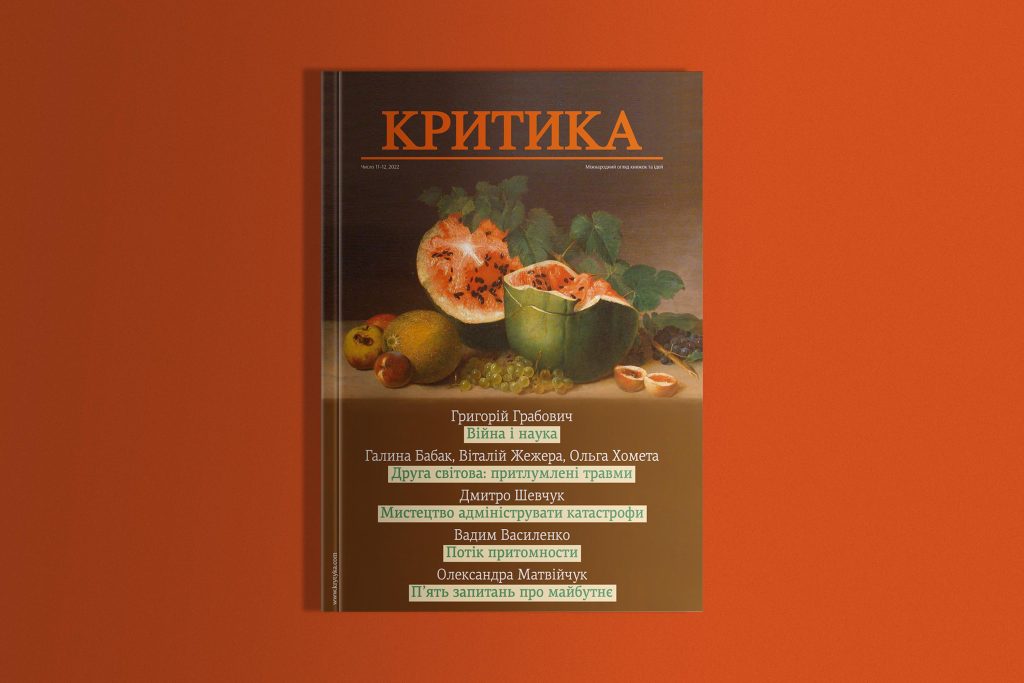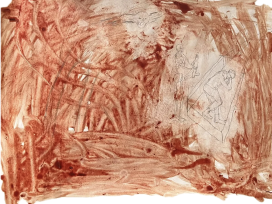
For those who suffered the consequences of Yalta’s division of Europe, the Helsinki Final Act brought grounds for optimism. Today, as Russia’s regressive war on Ukraine reopens old conflicts, it stands as a monument to European modernity.
Better late than never: decolonising Ukrainian academia. Also: the WWII diaries of literary critic Viktoriya Kolosova; placenames and language politics; and poetry on Jewish-Ukrainian legacies.
Academia in and about Ukraine is grappling with realities laid bare by Russia’s full-scale invasion of the country. Ukrainian and Russian academia have long been closely linked, and yet the latter supports the Russian invasion. In Krytyka, George G. Grabowicz, a professor of Ukrainian Literature at Harvard university, reflects upon this dilemma.
Ukrainian academia was thoroughly colonised during the Soviet period. During the thirty-one years of independence up to 2022, Ukrainian academia made insufficient progress towards autonomy, remaining heavily reliant on Russia sources and the Russian language. Meanwhile, Slavic studies in the West, with few exceptions, prioritizes Russian culture and replicates Russian hegemony in the region, at the expense of the study of other nations – not only Ukraine.

Grabowicz considers the utility of ‘cancel culture’ to the task of decolonising Ukrainian academia. Western academia is sceptical about cancel culture, but Grabowicz notes that distancing itself from Russian influence is of existential importance to Ukraine: ‘Studying Russian culture and talking with those who want to kill you – nobody would do that; the Allies didn’t do that when they were at war with Hitler.’
A new Ukrainian law proposes shielding the informational-educational sphere from Russian influence; in other words, banning it. But there are other possible solutions to decolonising academia: Grabowicz suggests developing the Ukrainian cultural canon as part of a ‘Marshall Plan’ to rebuild the country. New parameters for analysis need to be developed rather like the decolonisation paradigm that emerged in the wake of Indian independence; and Ukrainian studies must be promoted as an antidote to Russian colonialism and hegemony.
Galina Babak reviews the publication of Viktoriya Kolosova’s World War II diaries, chronicling the thoughts of a young woman who was 17 when the war reached Ukraine in 1940. ‘Yesterday the war started. It’s strange for me to write this sentence of three words,’ she notes. She could have been writing only yesterday.
Kolosova later became a literary critic and researcher of early-modern Ukrainian poetry. Her diary is valuable not only for documenting the formative years of an important scholar, but also for its rare insight into the thoughts and identity-formation of the first Soviet generation in Ukraine.
Much of the diary reflects upon books Kolosova has read, events in her own life, and the themes of first love and female friendship. She rarely writes about occupation and explosions. Keeping a diary was resistance enough to the war and totalitarian regime. And yet, Babak writes, the war is ‘present on every page’.
Kolsova occasionally reflects on the difficulty of coming to terms with the war. ‘There are no worse words on earth’ than ‘the war has started’, she comments in 1942. ‘I can’t write about it, I can only shout. But I can’t shout. I’m silent.’ She grapples with the reality of war from her position of relative safety, under occupation: ‘People are egoists … they live peacefully, eat, laugh, when at the same time others just like them are living through hellish minutes, when thousands are dying terrible deaths.’ Babak does not need to point out the parallel between Kolosova’s thoughts and those of many today – it obvious to any Ukrainian.
For Ukrainians, there are many echoes of WWII in the current war. Vitaliy Zhezhera recalls his grandmother’s story about a German field cook who mispronounced the name of the city Kharkiv (‘Harkoff’). Zhezhera reflects upon hearing Kharkiv repeatedly mentioned – and mispronounced – on broadcasts following the onset of the full-scale invasion in 2022. And not just Kharkiv: Ukrainian television and radio journalists, and even high-ranking officials, confused the pronunciation of complex and simple place names: ‘many of them were clearly reading these native place names for the first time in their lives – like soldiers of an invading army’.
The Russian pronunciation of place names persists, despite the state language being Ukrainian. Even the mayor of Kharkiv kept on calling the city ‘Kharkov’. The early days of the war were not the time to worry about such subtleties, but now these linguistic issues rankle: they are a reminder of the legacies of the Russian colonisation of Ukrainian culture.
Legacies of the past matter, as a new generation comes to experience the horrors of war on Ukrainian soil. An innovative poetry collection by Oleksandr Averbuch, reviewed by Olha Khometa, meditates upon the trauma of generations of Jews and Ukrainians. After the Nazi invasion, Ukraine’s Jews were massacred and a generation of young Ukrainians was transported to Germany as forced labour. Today, Ukrainians and Jews alike are suffering in a war started by Russia under the false pretences of ‘de-nazifying Ukraine’.
In his collection The Jewish King Averbuch ‘reconciles and honours hybrid Jewish-Ukrainian identity’. Drawing upon religious symbolism, letters sent by Ukrainian and Jews during WWII, and more recent experiences of displacement and destruction, Averbuch shares the testaments and pain of several generations. In the end, all the voices converge into one final couplet: ‘the only thing we want now/ is an acknowledgment of our pain.’
Published 1 February 2023
Original in English
First published by Eurozine
Contributed by Krytyka © Eurozine
PDF/PRINTSubscribe to know what’s worth thinking about.

For those who suffered the consequences of Yalta’s division of Europe, the Helsinki Final Act brought grounds for optimism. Today, as Russia’s regressive war on Ukraine reopens old conflicts, it stands as a monument to European modernity.

Artist Marharyta Polovinko’s creativity persisted in a tormented form through her experiences as a soldier on the Ukrainian frontline. The words of a recently called-up fellow creative and young family man provide a stark reminder that the Ukrainian military is buying Europeans time.